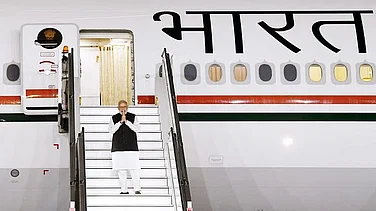From June 30 to July 2, leaders and foreign ministers of India, United States, Japan and Australia, Quadrilateral Security Dialogue (Quad), are gathering in Washington DC where the key discussion point is likely to be maritime domain awareness considering China’s latest military drills in the South China sea.
This year, the US Secretary of State Marco Rubio hosts the Quad summit. This meeting follows a January 2025 session led by Secretary Rubio, recommitting to a “free, open and secure Indo‑Pacific.” India is set to host a Quad leaders’ summit later this year.
While the main theme is maritime domain awareness, given the events of the past six months, it is likely to be an intense session with discussions on from the intensifying regional tensions in the middle-east, the consequential global policy and alliance shifts, besides China’s expansion in the South China sea.
Formed in 2007 in the aftermath of the 2004 Indian Ocean tsunami, Quad began as an informal platform for the four countries to consult on humanitarian relief. The dialogue gained fresh importance in 2017 amid China’s expanding maritime strategy and increasing assertiveness in land reclamation and territorial claims. China’s Maritime Silk Road Initiative (MSRI) also presents a unique concern to each member country.
The Quad, which is not a military alliance, aims at initiating and maintaining an open and free Indo-Pacific region, and provides means for peaceful dispute resolution between member countries. Over the past four years, Quad Leaders have met six times, including twice virtually, once virtually hosted by former US President Joe Biden in 2021.
Although Rubio has not mentioned China explicitly, Senior diplomats have reiterated that the four countries need to collectively stand against China’s coercive tactics in contested zones.
India’s Diplomatic Goals
External Affairs Minister S Jaishankar left for Washington DC on June 30 and will be in the US till July 2 to attend the Quad Foreign Ministers' Meeting (QFMM) on July 1. The EAM’s visit comes at the behest of an invitation extended Rubio, the Ministry of External Affairs (MEA) has said in a statement.
The MEA said that the July 1 Quad meeting will build on discussions held at the previous QFMM in Washington earlier this year in January. The ministers from Australia, India, Japan, and the US are expected to exchange views on key regional and global issues, particularly relating to the Indo-Pacific. They will also review progress on Quad initiatives and consider new proposals ahead of the upcoming Quad Leaders’ Summit, to be hosted by India.
China and India’s Balancing Act
India’s main concern at Quad summit would likely be China’s growing expansion in the South China sea. The country conducted its ‘largest’ military, civilian rescue drill in contested South China Sea just two days ago on July 28.
However, India has always strategically distanced itself from military coalitions while asserting its role as a leader in the Indo-Pacific region.
India has never directly confronted China, its participation in Quad is a strategic given the other three member-countries’ ability to aid the subcontinental country with surveillance, intelligence-sharing and joint naval drills like Malabar, which was initially a bilateral exercise between India and the US, but has since been expanded to include Japan in 2015 and Australia in 2020.
Anti-Terrorism Measures
During his visit in the US, Jaishankar is slated to inaugurate an exhibition titled The Human Cost of Terrorism at the United Nations Headquarters in New York on June 30. The exhibition highlights the global impact of terrorism.
India is likely to use the Quad summit to propose more stringent anti-terrorism measures, especially in West Asia.
Supply‑Chain and Infrastructure for Tech Industry
While India’s agenda at Quad is largely security-based, Jaishankar is also likely to bring up India’s requirement for supply networks for its growing technology sector. This will include access to semiconductors, critical minerals, and clean energy, and will be part of Quad initiatives such as the Quad Investors Network and new infrastructure conferences
Through the “Mission 500” bilateral trade push with the US, reducing trade deficit and boosting the domestic manufacturing ecosystem is also likely on India’s agenda.
Part of India’s agenda at Quad is likely to propel forward its digital infrastructure, cybersecurity and climate adaptation with the help of other Quad countries.
Pandemic Preparedness
The Quad Health Security Partnership is cornerstone to the dialogue. This includes vaccine cooperation, pandemic simulations and a new cancer‑moonshot initiative focused on cervical cancer. India has said it will be co‑hosting workshops and releasing guidelines on health crisis responses.
Later this year, India will to host the first Quad Leaders’ Summit in either Delhi or Mumbai, MEA has said. This gathering is likely to include dialogues on defence of regional ports, health, and climate.















